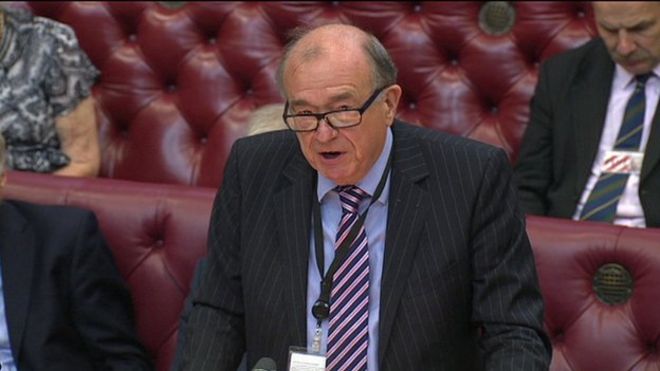Lord Sewel has resigned from the House of Lords after being filmed allegedly taking drugs with prostitutes. Footage obtained by The Sun on Sunday appeared to show the peer – who had been deputy speaker of the Lords – snorting powder from a woman’s breasts.
Footage obtained by The Sun on Sunday appeared to show the peer – who had been deputy speaker of the Lords – snorting powder from a woman’s breasts.
In a letter to the Clerk of the Parliaments, he wrote: “I want to apologise for the pain and embarrassment I have caused.”
He said he hoped his decision would “limit and help repair” the damage.
Police have also launched a criminal investigation and searched a property in central London.
The Metropolitan Police said it was looking into “allegations of drug-related offences involving a member of the House of Lords”.
‘Public confidence’
On Monday, the peer requested a leave of absence from the Lords, but sources had suggested he did not plan to quit.
But in letter published on Tuesday, he wrote: “The question of whether my behaviour breached the Code of Conduct is important, but essentially technical.
“The bigger questions are whether my behaviour is compatible with membership of the House of Lords and whether my continued membership would damage and undermine public confidence in the House of Lords.
“I believe the answer to both these questions means that I can best serve the House by leaving it.”
On Monday, Lord Sewel was also pictured wearing an orange bra and leather jacket as he reclined, smoking a cigarette.
Footage showed him making disparaging remarks about a number of senior politicians, including the prime minister.

Biography
- Name: John Buttifant Sewel
- Age: 69
- Title: Lord Sewel, of Gilcomstoun in Aberdeen
- Educated at Durham and Aberdeen universities
- Worked as a lecturer at Aberdeen University
- Joined the House of Lords in 1996
- Lords career: Parliamentary under Secretary of State, Scottish Office, 1997-1999, opposition Scotland spokesman 2010, elected chairman of committees in 2012
- UK representative to Nato Parliamentary Assembly, 1999-2002
Lord Sewel and House of Lords rules

Although Lord Sewel has resigned from the House of Lords he keeps the peerage he was given by the then Labour leader Tony Blair in 1996.
Lord Hill, a former leader of the House of Lords, said those “responsible for setting standards” in the Lords must uphold them.
“His position was not tenable,” he told BBC Radio 4’s Today programme. “I am glad that he has had a change of heart. I think he has done the right thing and I am relieved that has happened.”
Asked why it had taken him nearly three days to quit, Lord Hill – who is now a European Commissioner – said “better late than never”.
If the peer had not quit, Lord Hill added, he was sure the enhanced disciplinary and enforcement system in the Lords – which now permits peers to be expelled in certain circumstances – would have “cranked up”.
He defended the work of the House of Lords, while acknowledging its size should be “kept an eye on”. While the misconduct of a few people had “tarred its reputation”, he insisted the institution was still doing its job of revising legislation and holding the government to account effectively.
As a junior Scottish Office minister in the government of Tony Blair, Lord Sewel helped steer legislation through the House of Lords which paved the way for a Scottish Parliament.
As a result, his name was given to the so-called Sewel convention, which allows the UK Parliament to pass legislation on a devolved issue extending to Scotland, over which the Scottish Parliament has legislative authority.
He stood for the Scottish Parliament in its inaugural election in 1999 but was not successful. He is also a member of the Nato parliamentary assembly, attended by politicians from the defence alliance’s 28 members.
He quit his £84,500 a year role as deputy speaker of the Lords and chairman of the Lords privileges and conduct committee in the wake of the revelations on Sunday.






























